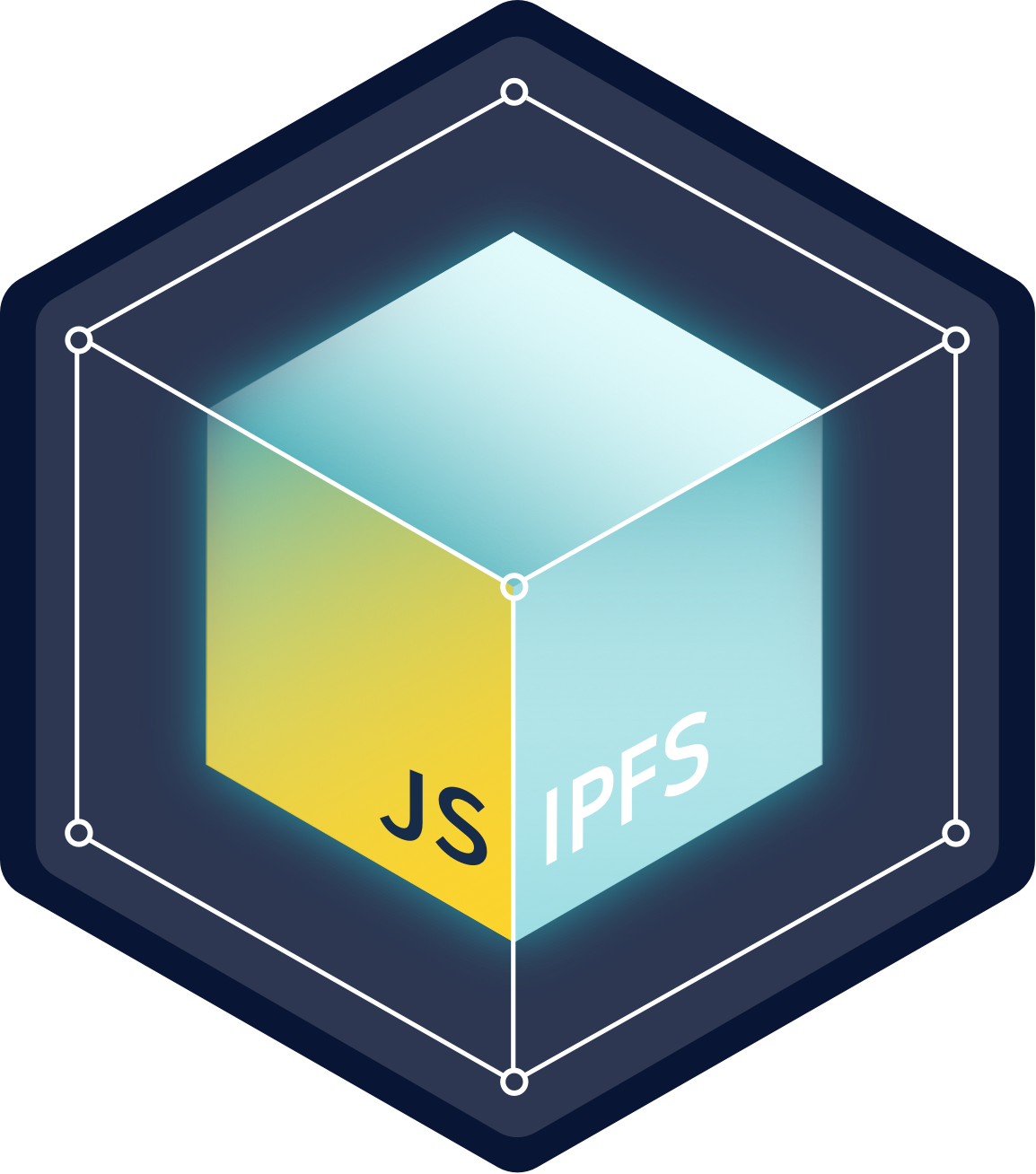📚 Learn more about this deprecation or how to migrate
⚠️ If you continue using this repo, please note that security fixes will not be provided
- Read the docs
- Ensure CORS is correctly configured for use with the HTTP client
- Look into the examples to learn how to spawn an IPFS node in Node.js and in the Browser
- Consult the Core API docs to see what you can do with an IPFS node
- Head over to https://proto.school to take the IPFS course that covers core IPFS concepts and JS APIs
- Check out https://docs.ipfs.io for glossary, tips, how-tos and more
- Need help? Please ask 'How do I?' questions on https://discuss.ipfs.io
- Find out about chat channels, the IPFS newsletter, the IPFS blog, and more in the IPFS community space.
Installing ipfs globally will give you the jsipfs command which you can use to start a daemon running:
$ npm install -g ipfs
$ jsipfs daemon
Initializing IPFS daemon...
js-ipfs version: x.x.x
System version: x64/darwin
Node.js version: x.x.x
Swarm listening on /ip4/127.0
.... more outputYou can then add a file:
$ jsipfs add ./hello-world.txt
added QmXXY5ZxbtuYj6DnfApLiGstzPN7fvSyigrRee3hDWPCaf hello-world.txtIf you do not need to run a command line daemon, use the ipfs-core package - it has all the features of ipfs but in a lighter package:
$ npm install ipfs-coreThen start a node in your app:
import * as IPFS from 'ipfs-core'
const ipfs = await IPFS.create()
const { cid } = await ipfs.add('Hello world')
console.info(cid)
// QmXXY5ZxbtuYj6DnfApLiGstzPN7fvSyigrRee3hDWPCafThis project is broken into several modules, their purposes are:
/packages/interface-ipfs-coreTests to ensure adherence of an implementation to the spec/packages/ipfsAn aggregator module that bundles the core implementation, the CLI, HTTP API server and daemon/packages/ipfs-cliA CLI to the core implementation/packages/ipfs-coreThe core implementation/packages/ipfs-core-typesTypescript definitions for the core API/packages/ipfs-core-utilsHelpers and utilities common to core and the HTTP RPC API client/packages/ipfs-daemonRun js-IPFS as a background daemon/packages/ipfs-grpc-clientA gRPC client for js-IPFS/packages/ipfs-grpc-protocolShared module between the gRPC client and server/packages/ipfs-grpc-serverA gRPC-over-websockets server for js-IPFS/packages/ipfs-http-clientA client for the RPC-over-HTTP API presented by both js-ipfs and go-ipfs/packages/ipfs-http-serverJS implementation of the Kubo RPC HTTP API/packages/ipfs-http-gatewayJS implementation of the IPFS HTTP Gateway/packages/ipfs-http-responseCreates a HTTP response for a given IPFS Path/packages/ipfs-message-port-clientA client for the RPC-over-message-port API presented by js-ipfs running in a shared worker/packages/ipfs-message-port-protocolCode shared by the message port client & server/packages/ipfs-message-port-serverThe server that receives requests from ipfs-message-port-client
List of the main packages that make up the IPFS ecosystem.
| Package | Version | Deps | CI/Travis | Coverage | Lead Maintainer |
|---|---|---|---|---|---|
| Files | |||||
ipfs-unixfs |
 |
Alex Potsides | |||
| Repo | |||||
ipfs-repo |
 |
Alex Potsides | |||
ipfs-repo-migrations |
 |
N/A | |||
| Exchange | |||||
ipfs-bitswap |
 |
Dirk McCormick | |||
| IPNS | |||||
ipns |
 |
Vasco Santos | |||
| Generics/Utils | |||||
ipfs-utils |
 |
Hugo Dias | |||
ipfs-http-client |
 |
Alex Potsides | |||
ipfs-http-response |
 |
Vasco Santos | |||
ipfsd-ctl |
 |
Hugo Dias | |||
is-ipfs |
 |
Marcin Rataj | |||
aegir |
 |
Hugo Dias | |||
| libp2p | |||||
libp2p |
 |
Jacob Heun | |||
peer-id |
 |
Vasco Santos | |||
libp2p-crypto |
 |
Jacob Heun | |||
libp2p-floodsub |
 |
Vasco Santos | |||
libp2p-gossipsub |
 |
Cayman Nava | |||
libp2p-kad-dht |
 |
Vasco Santos | |||
libp2p-mdns |
 |
Jacob Heun | |||
libp2p-bootstrap |
 |
Vasco Santos | |||
@chainsafe/libp2p-noise |
 |
N/A | |||
libp2p-tcp |
 |
Jacob Heun | |||
libp2p-webrtc-star |
 |
Vasco Santos | |||
libp2p-websockets |
 |
Jacob Heun | |||
libp2p-mplex |
 |
Vasco Santos | |||
libp2p-delegated-content-routing |
 |
Jacob Heun | |||
libp2p-delegated-peer-routing |
 |
Jacob Heun | |||
| IPLD | |||||
@ipld/dag-pb |
 |
N/A | |||
@ipld/dag-cbor |
 |
N/A | |||
| Multiformats | |||||
multiformats |
 |
N/A | |||
mafmt |
 |
Vasco Santos | |||
multiaddr |
 |
Jacob Heun |
This table is generated using the module
package-tablewithpackage-table --data=package-list.json.
The IPFS implementation in JavaScript needs your help! There are a few things you can do right now to help out:
Read the Code of Conduct and JavaScript Contributing Guidelines.
- Check out existing issues The issue list has many that are marked as 'help wanted' or 'difficulty:easy' which make great starting points for development, many of which can be tackled with no prior IPFS knowledge
- Look at the IPFS Roadmap This are the high priority items being worked on right now
- Perform code reviews More eyes will help a. speed the project along b. ensure quality, and c. reduce possible future bugs.
- Add tests. There can never be enough tests.




